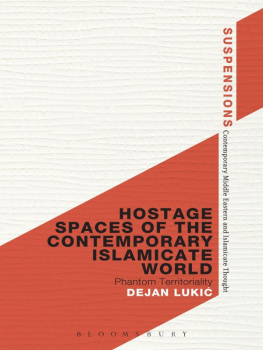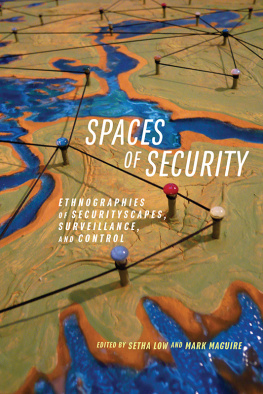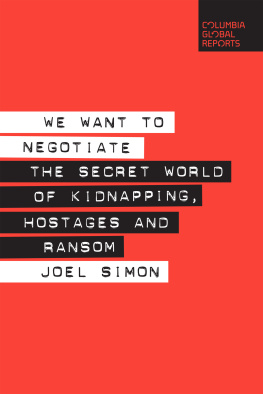Hostage Spaces of the
Contemporary Islamicate World
Suspensions: Contemporary Middle Eastern and Islamicate Thought
Series editors: Jason Mohaghegh and Lucian Stone.
This series interrupts standardized discourses involving the Islamicate world by introducing creative and emerging ideas. The incisive works included in this series provide a counterpoint to the reigning canons of theory, theology, philosophy, literature, and criticism through investigations of vast experiential typologiessuch as violence, mourning, vulnerability, tension, and humourin light of contemporary Islamicate thought.
The Poetics of Mourning in the Middle East, Alina Gharabegian
The Politics of Writing Islam, Mahmut Mutman
The Writing of Violence in the Middle East, Jason Bahbak Mohaghegh
Hostage Spaces of the Contemporary Islamicate World
Phantom Territoriality
Dejan Luki
Suspensions: Contemporary Middle Eastern and Islamicate Thought

Bloomsbury Academic
An imprint of Bloomsbury Publishing Plc
50 Bedford Square London WC1B 3DP UK
175 Fifth Avenue New York NY 10010 USA
www.bloomsbury.com
First published 2013
Dejan Luki, 2013
All rights reserved. No part of this publication may be reproduced or transmitted in any form or by any means, electronic or mechanical, including photocopying, recording, or any information storage or retrieval system, without prior permission in writing from the publishers.
Dejan Luki has asserted his right under the Copyright, Designs and Patents Act, 1988, to be identified as Author of this work.
No responsibility for loss caused to any individual or organization acting on or refraining from action as a result of the material in this publication can be accepted by Bloomsbury Academic or the author.
British Library Cataloguing-in-Publication Data
A catalogue record for this book is available from the British Library.
ISBN: 978-1-4411-3773-9
Library of Congress Cataloging-in-Publication Data
Luki, Dejan.
Hostage spaces of the contemporary Islamicate world : phantom territoriality / Dejan Luki.
p. cm.(Suspensions, contemporary Middle Eastern and Islamicate thought)
Includes bibliographical references and index.
ISBN 978-1-4411-9484-8ISBN 978-1-4411-6035-5 (ebookpdf) 1. Political kidnapping. 2. Terrorism. 3. Hostages. 4. TerrorismReligious aspectsIslam. I. Title.
HV6431.L855 2012
364.154091767dc23
2012019252
Contents
Series Foreword
Poets, artists, theologians, philosophers, and mystics in the Middle East and Islamicate world have been interrogating notions of desire, madness, sensuality, solitude, death, time, space, etc. for centuries, thus constituting an expansive and ever-mutating intellectual landscape. Like all theory and creative outpouring, then, theirs is its own vital constellationa construction cobbled together from singular visceral experiences, intellectual ruins, novel aesthetic techniques, social-political-ideological detours, and premonitions of a futurebuilt and torn down (partially or in toto), and rebuilt again with slight and severe variations. The horizons shift, and frequently leave those who dare traverse these lands bewildered and vulnerable.
Consequently, these thinkers and their visionary ideas largely remain unknown, or worse, mispronounced and misrepresented in the so-called western world. In the hands of imperialistic frameworks, a select few are deemed worthy of notice and are spoken on behalf of, or rather about. Their ideas are simplified into mere social formulae and empirical scholarly categories. Whereas so-called western philosophers and writers are given full leniency to contemplate the most incisive or abstract ideas, non-western thinkers, especially those located in the imagined realms of the Middle East and Islamicate world, are reduced to speaking of purely political histories or monolithic cultural narratives. In other words, they are distorted and contorted to fit within hegemonic paradigms that steal away their more captivating potentials.
Contributors to this series provide a counterpoint to the reigning canons of theory, theology, philosophy, literature, and criticism through investigations of the vast experiential typologies of such regions. Each volume in the series acts as a suspension in the sense that the authors will position contemporary thought in an enigmatic new terrain of inquiry, where it will be compelled to confront unforeseen works of critical and creative imagination. These analyses will not only highlight the full range of current intellectual and artistic trends and their benefits for the citizens of these phantom spheres, but also argue that the ideas themselves are borderless, and thus of great relevance to all citizens of the world.
Jason Bahbak Mohaghegh and Lucian Stone
Preface: Diagrammatic Intensifications
A line of pure methodology: It is impossible to think or write without some faade of a house at least rising up, a phantom, to receive and to make a work of our peregrinations. The entire interplay of violence, war, and torture that occurs in the militant sphere between what we call the East and the West could be viewed as a battle of faades rather than of ideologies or civilizations. In fact, one side is nothing more than a faade of the other.
A phantom appears disappearing. This is its divine character, so to speak, since God too, especially in Islamic thought, manifests himself in his withdrawal from the world. This book is concerned with the space of phantomality, the space of separation, the space of withdrawal. In addressing the divine character of violence through militancy, or terrorism, I certainly do not want to sacralize it. The relationship between violence and the sacred has already been established by numerous authors, and the role of the theological in political terminology has also been rigorously, albeit controversially, unveiled by Carl Schmitt. Rather, I want to point out the convergence of the theological (that which belongs to the enunciation of God) with the political (that which belongs to the enunciation of the sovereign) in the construction of militant space, or what can now be called the hostage space. In this respect, hostage taking is a fractal detail in the history of conflicts on our planet. It is a detail around which powers of war, law, and sovereignty circle like a planetary constellation around a black holeor, hostage taking is the event horizon in the cosmos of sovereignty.
In the Fall of 2007, I took a boat along the Adriatic coast from the old town of Dubrovnik in Croatia to a coastal village in the Lezh district of Albania. Once on the beach, I first entered into an abandoned bunker, a courtesy of the ex-president and communist sovereign Enver Hoxha and his attitude toward the world: protection by hyper-insulation. (Indeed, during his presidency the entire nation was nothing but a crowded bunker, sealed off from the outside world.) But then another half-domed building invited my eyes. I walked into a small mosque with only one man inside. He was old, and spoke broken Serbo-Croatian. In a short conversation without a linear thread, he told me two things: (a) that throngs of medusas (also known as jellyfish) have swarmed the coast close to the village, as part of their yearly visitation each September, giving hardship to local fishermen since they eat large quantities of anchovy plankton, and (b) that his son has disappeared on his way to the Italian side of the Adriatic (direction: port of Bari) in the venture of illegal human trafficking. Through these two stories I began to think of the phantom territories, hostage spaces, witnessing, war, politics, theology, the East/West divide, and conspired toward a reality that underlies this book.













